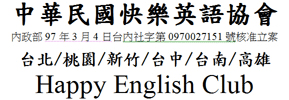網站 http://www.happyforum.org/ 歡迎超連結並轉寄網址
論壇 http://www.happyforum.org/happy/ 歡迎至論壇討論
Time:第 176次例會,2008年10月04日(週六)下午2:30 ~5:30
Place:
viewtopic.php?t=15
14:30~15:30 Free Talk
15:30~16:00 Speaker Session
16:00~17:15 Topic Discussion
17:15~17:30 Happy Time
Host: Richard Chen
Assistant Host:
Topic:Four things to think about before you say, "I'll take it"
Source:
Blackfriars Communications, a marketing consultancy firm in Maynard, Massachusetts.
Six hundred fifteen billion dollars. Our national debt comes to mind—but no, this is the latest estimate of what U.S. companies spend a year on marketing.* With such an investment, it's hardly surprising that corporations are so skilled at getting us to buy products we don't need. You can outsmart them, however, says Dan Ariely, PhD, author of the best-selling new book Predictably Irrational and professor of behavioral economics at MIT, if you watch out for these four purchasing snares.
The Free Offer: "As with heavy traffic, when you see 'free,' slow down and be cautious," Ariely suggests. A common example is the promise of free shipping. Very often that's built into the price of the product, or it's contingent on your spending over a certain amount. "The appeal of zero cost is tied to the fear of losing something—mostly money in this case, but also making a poor decision," he explains. "There appears to be no possibility of loss when we choose something free, but, of course, the risk is usually just not visible."
Context Inflation: "If you've been given an estimate of $40,000 to renovate your home," Ariely says, "adding a $4,000 fireplace may not seem like much of a stretch, until you think about other things it could buy—as in, $4,000 could pay for a vacation or new computers for the family." The dollar figure alone may not register.
The Decoy: A coffee chain might offer three cup sizes: a 12-ounce at $1.77, 16 ounces at $1.98, and 20 ounces at $2.09. Even though the company could profit nicely by selling the largest cup at 75 cents, because of the two smaller decoys we feel that $2.09 is a bargain and happily pay it. "When you see a range of prices, it's as if you were coming from a dimly lit room into a bright one; at first you're not used to the light, but you quickly adjust. We don't think about how much money is worth to us; we just make a relative decision."
Too Many Choices: Ariely's research shows that we like to keep our options open (the "fear of loss" thing again)—so we'll buy the high-tech (high-priced) camera with functions we never end up using. If you're deciding on an item that comes in many models, Ariely suggests giving yourself a time limit: "When you're down to the final two options, toss a coin, and while it's in midair, try to feel how you want it to fall—that's your answer."
contingent (adj.)附加條件的
renovate (v.) 修繕
Questions:
Q1. Are you an impulsive buyer?
Q2.What is the most expensive useless thing you had bought?
Q3.How is your purchasing behavior affected by the commercials?
參與例會,請自行列印當週的討論文章並帶至現場,圖示如下:

http://www.happyforum.org/
新竹,每週六 (2008年8月起)
Hsinchu, Every Saturday
from Aug, 2008
Place:
viewtopic.php?t=15

台中,每週六 (2008年7月起)
Taichung, every Saturday
from July, 2008
Place:
viewtopic.php?t=15

高雄,每週六 (2007年4月起)
Kaohsiung, every Sunday
from April, 2007
Place:
viewtopic.php?t=15

台北,每週六 (2005年6月起)
Taipei, every Saturday
from June, 2005
Place:
viewtopic.php?t=15






















